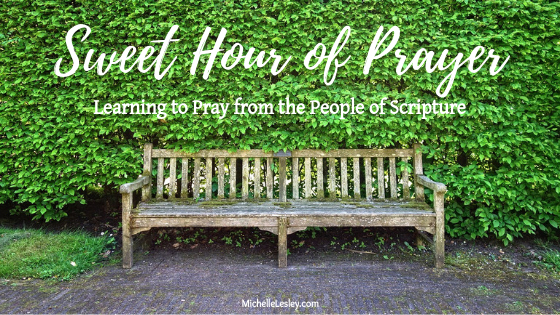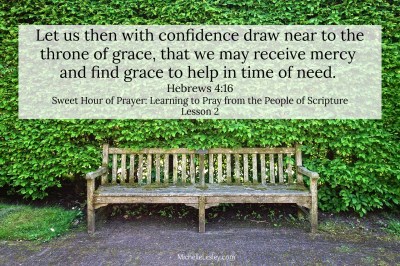
Previous Lessons: 1
 Read 1 Samuel 1
Read 1 Samuel 1
Hannah’s First Prayer
![]()
Questions to Consider
1. Are you familiar with what is going on in the history of Israel at this time? If not, use this synopsis (or another Bible Book Background) to bring you up to speed.
2. Carefully read verses 1-9. In your own words, briefly summarize the circumstances in Hannah’s life leading up to her first prayer (in 10-11).
3. Examine verses 10,15,16. What words are used to describe Hannah’s emotional and spiritual state? It has often been said that prayer shouldn’t be our last resort – that we shouldn’t wait until circumstances are desperate before we pray. Does it seem like that’s what’s going on here with Hannah, that she only turned to God as a last resort, or that this was the culmination of many prayers over the years? On what, from chapter 1, are you basing your answer? Compare 10,15,16 with 18b. How did Hannah’s emotional and spiritual state change after pouring her heart out to God? What can we learn from Hannah’s first prayer about pouring our hearts – our feelings – out to God?
4. Where did Hannah go to pray? (9-10) Why do you think it was important to her to pray at the temple? (Hint: Examine what she says about the house of the Lord and the “presence of the Lord” in 21,22,24). Could God only hear her, or would He only be willing to answer her, if she were praying in His house? True or false: God hears us better and our prayers carry more weight if we’re praying in church, or at the front of the sanctuary (at the “altar”) during a special time of the worship service, than if we’re praying at home, in the car, etc.?
5. Examine the content of Hannah’s first prayer. (11) What is Hannah praying for, and for whom? Is it OK to pray for the things our hearts long for? Why or why not?
“O Lord of hosts,” – How does Hannah start off her prayer? How does she address God? Compare this with the beginning of the Lord’s Prayer. How should this inform our own prayers?
“if you will indeed look on the affliction of your servant and remember me and not forget your servant” – What is Hannah seeking in this part of her prayer? Compare Hannah’s thoughts and request here with Hagar’s characterization of God as, “a God of seeing…I have seen him who looks after me.”
“but will give to your servant a son,” – How would you describe Hannah’s request? Is she timid and equivocating, or bold, direct, and specific? How does Hebrews 4:16 relate to this part of Hannah’s prayer?
“then I will give him to the Lord all the days of his life, and no razor shall touch his head.” – (Use your footnotes and cross references if you’re not familiar with what Hannah is talking about here.) Hannah includes a vow, or promise to God, with her prayer, which is not something we’re accustomed to doing. Most of us have probably heard the story of the guy on his deathbed who promises God that if He will just let him live, he’ll live a good life, go to church every week, etc. We’ve been taught that’s “bargaining with God” and that we shouldn’t do that. Is Hannah bargaining with God in that same sense? What, from today’s passage would lead you to say “yes” or “no”? Have you ever made a vow to God in prayer? Did you keep that vow? Why might it be wise or unwise to make a vow to God when requesting something in prayer? Look up the word “vow” in a concordance. Does vowing seem to be more of an Old Testament thing or a New Testament thing? Why do you think that is?
6. Examine verse 19. Did Hannah go in to worship the Lord before or after He answered her prayer? Was her worship an attempt to manipulate God into giving her what she wanted, a response to knowing for a fact that He was going to give her what she wanted, or was her worship simply part of who she was as someone who loved God, regardless of whether or not He gave her what she wanted? Do you worship God continuously, whether or not He gives you what you’ve asked for in prayer?
7. Read 19-20. Did Hannah and Elkanah sit idly by and wait for God to provide a miraculous conception? What did they do? If you need a job, do you pray for God to send you a job and then sit on the couch watching TV and waiting for someone to call and ask you to come work for them, or do you ask God to provide a job and then read the want ads, fill out applications, and go on interviews? Explain how God blesses and answers prayer through the normal, day to day means and methods He has established. Is it any less “miraculous” for God to answer prayer through normal means and methods than to answer prayer in extraordinary way? Why? How did Hannah honor and recognize God for answering her prayer? (20b) How was Samuel, for the rest of his life, just by virtue of his name, a testimony to God answering prayer?
8. Study 21-28. Did Hannah keep the vow she made to the Lord? Why is this important? What was Hannah’s testimony of God’s answer to her prayer? (26-28) How do you think this impacted Eli? How can it be an encouragement to your pastor and your brothers and sisters in Christ to share with them how God has answered your prayers or worked in your life? We often share prayer requests. We don’t often share God’s answers. How might sharing God’s answers to prayer encourage others to pray?
Homework
•Think about one of the aspects of Hannah’s prayer we studied today – pouring out your heart to God, honoring His name in your prayers, worship, God’s work through normal means, etc. – and apply this aspect to your own prayer life this week.
•How has God answered a prayer or worked in your life in some way? Encourage your pastor, and share it with him!
Suggested Memory Verse

(Every week of our study, you’ll see a suggested memory verse like the one above. You are welcome to grab the memory verse pic to use as your screensaver or wallpaper on your phone or computer, print it out and stick it somewhere you’ll see it frequently, or use it in any other way you wish to help you memorize the verse.)


I wanted to share my thoughts on question 2.
I don’t think Hannah was wrong to share her desires, God already knows them. The fact that she surrender her greatest desire to God is what is significant. I often have wondered if prior to this, Hannah’s prayers for a child didn’t include being willing to give him to God. Many times I pray for things out of selfish desires. Only when I am willing to surrender to God do I find the same peace & freedom Hannah did.
LikeLike
Great insights, Holly! Thanks for sharing. :0)
LikeLike
I think Hannah must have been so heartbroken, her prayers were so sincere. I try to imagine what I would be feeling and the look of anguish that would be mistaken for being drunk must have been overwhelming for her.
LikeLike
Great insight!
I always think of it from Eli’s perspective. In the next chapter or two 1 Samuel talks about how evil his sons were as they served as priests. Eli’s interaction with Hannah here makes me think he was so jaded by seeing the evil behavior of his sons that he had forgotten what it looked like when someone was genuinely pouring her heart out before the Lord. He really stuck his foot in his mouth.
LikeLike
Other than using copy and paste, is there any way to get this study in print? I like having things in print in front of me rather than on the computer or my phone.
LikeLike
Hi Pauletta – I totally understand, and thanks for using my studies! I’m so sorry, but the studies aren’t available in a book format. You might ask a friend who’s more technically inclined than I am if there’s any way to give the links to the lessons to someone at a print shop (like Kinko’s – do those even still exist? :0) and pay them to print and bind it for you. Do be aware, though, that I put a lot of helpful links into the lessons’ questions, and those won’t be available to you if you use a print version.
LikeLike